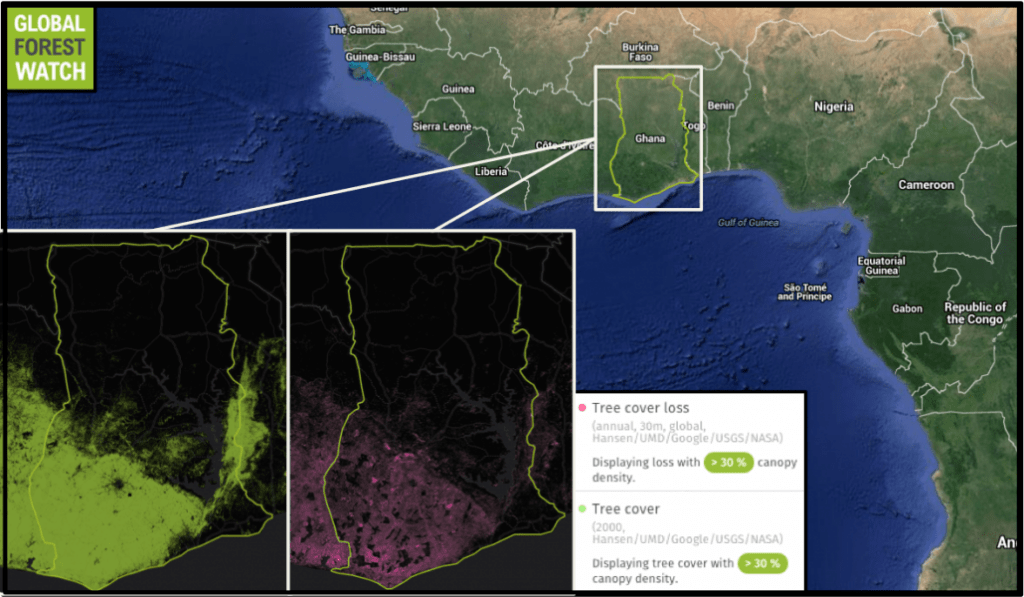China is the largest global consumer of rosewood and skyrocketing demand over the past decade and a half is having serious repercussions for some of the world’s most endangered old-growth forests and local forest communities.
Rosewood imports into China increased some 1,250 percent since 2000 and were worth an estimated $2.6 billion between 2013 and 2014 alone, according to a new report from Washington, D.C.-based non-profit Forest Trends.
Several species of rosewood, collectively known as hongmu, are prized by Chinese furniture manufacturers who use them to make products that are highly coveted status symbols. The majority of rosewood imports into China traditionally come from Southeast Asian countries like Cambodia, Laos, Myanmar and Vietnam.

Ghana’s relatively dense forests are found primarily in the southern part of the country, and are under threat from logging, agriculture, and fire. Global Forest Watch shows Ghana’s tree cover declined nearly 9 percent from 2001 through 2014, and previous research indicates only around 20 percent of the country’s forests remain today.
But in 2014, when imports were at an all-time high, nearly half came from Nigeria, Ghana and other African countries, whereas those countries supplied just 10 percent of Chinese rosewood imports a decade ago, per the report.
The Forest Trends report says that imports from Africa have surged over the past couple years as the forests of Southeast Asia become increasingly depleted and demand for hongmu furniture only continues to grow. Lower quality rosewood varieties from Africa, it turns out, are allowing China’s ballooning middle class to have access to the traditional status symbols they desire at a lower price point they can afford.
“There is strong evidence that this booming demand is being met by rosewood that has been illegally harvested, with dire consequences for complex ecosystems in some of the world’s most biodiverse forests,” report author Naomi Basik Treanor said in a statement.
Many Asian and African countries ban the harvesting or exporting of rosewood, according to Basik Treanor. However, despite the fact that large numbers of people in those countries rely on rosewood as a source of fuel and medicine, corrupt officials and poor governance are allowing loggers to flout the export bans.
“Unfortunately, regulatory frameworks in countries where rosewood grows are often inadequate, not being implemented, or are consistently undermined by corruption and bribery,” Basik Treanor added.
In other words, China’s demand for rosewood is not just bad for forests, but severely impacting the lives and livelihoods of numerous forest-dependent people, as well.
For instance, the report cites evidence that as much as 95 percent of rosewood exports reported to be from the Gambia were actually harvested in neighboring Senegal and can thus be considered “conflict timber” due to the fact that the main separatist movement in southern Senegal, along the Gambia’s border, is a beneficiary of the illegal rosewood trade.
Forest Trends found that much of the rosewood imports are being shipped through Hong Kong ports, which are less carefully monitored than ports in mainland China, where officials have stepped up efforts to enforce the Convention on International Trade in Endangered Species of Wild Fauna and Flora (CITES).
Nonetheless, this is not the first time this year that China was implicated as a nexus in the global illegal timber trade. In October, US company Lumber Liquidators pled guilty to violating the Lacey Act, which prohibits the trade in illegally harvested wood, after it was found to be a major customer of a Chinese company that was importing vast quantities of illegal timber from the Russian Far East.
Given this new data on the country’s role in the trade of illegally harvested rosewood, China is in a unique position to take a leadership role in tackling the illegal timber trade, Kerstin Canby, director of Forest Trends’ Forest Trade and Finance Program, said in a statement.
“China already has in place some existing frameworks related to the sale of rosewood, as well as emerging systems to verify the legal provenance of timber importers,” Canby said, “and these could serve as a foundation for more robust and legally binding legislation to curb illegal timber imports.”
Click here to read the original article.
